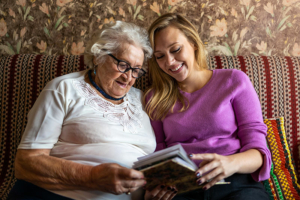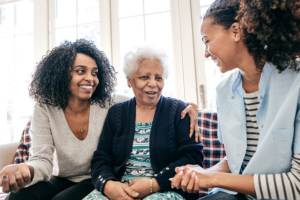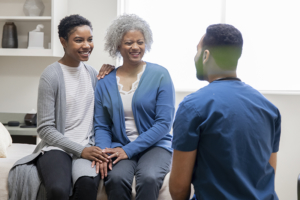Simple, Effective Strategies You Can Try Today to Improve Memory

Help seniors improve memory with these simple strategies.
Do you recall learning the order of colors of the rainbow as a child? A lot of us were introduced to Roy G. Biv to master this feat – one of many mnemonics we learn that, interestingly, often stay with us for a lifetime.
As we age, it’s expected to experience some level of memory impairment; and naturally, it’s even more pronounced when Alzheimer’s disease or another form of dementia is a factor. Scientists are constantly aiming to locate effective ways to improve memory and cognitive functioning, and have observed some interesting findings on “old school” strategies such as mnemonics. Here’s what they have recently discovered:
Mnemonics
Mnemonics produces a link to a memory through a phrase, abbreviation, song, etc. This training yielded great results in increasing activity in areas of the brain that are affected by dementia, leading to improved retention of information.
There are a multitude of mnemonic strategies that are very effective in improving memory. For example, try mnemonic keywords. Mnemonic keywords are fun and creative ways to memorize words in another language. It involves selecting a word that’s much like the new word you want to learn, and visualizing an image that brings the two words together. For instance, if you’re wanting to remember that chapeau is French for the term “hat,” you might picture Charlie Chaplin along with his famous black hat. The “Chap” element of his name can trigger the initial letters in chapeau, and the memory will stick.
Spaced Retrieval Training
This strategy involves gradually increasing the amount of time between memory tests, and was shown to also be highly effective for those with dementia. Compared to mnemonics, however, there was actually a decrease in brain activity, which led medical researchers to determine that the information had been processed more efficiently.
This training method is very effective in increasing independence and minimizing anxiety for those with cognitive challenges. Choose a desired event or activity for the person to keep in mind, such as a lunch date with a buddy on Friday. Start by asking the person a question to establish whether or not the memory is already in place. If not, remind them they are having lunch with John on Friday. Wait 15 seconds, and ask the individual the question again. If the memory is in place now, increase the time to 30 seconds, and ask again, continuing to double the time and ask again. If the person does not remember after 15 seconds, keep repeating the process every 15 seconds several more times before determining that it is not an effective technique, at least not for this particular event or activity.
Both strategies are simple, drug-free approaches to incorporate into the treatment for someone during the early stages of Alzheimer’s, or even for anyone who is looking for approaches to improve memory.
Let Responsive Home Care provide additional resources and support for someone you love with dementia. Our creative approaches to help improve memory make the most of an older adult’s cognitive functioning, independence, and wellbeing. Contact us online or call (954) 486-6440 for more information about our home care assistance in Fort Lauderdale and the nearby areas.








 If your child suddenly developed an illness, who would you call? It’s a no-brainer; many parents have the number on speed dial for the pediatrician they have carefully selected to oversee the medical care needs of their children. Due to their specialized training, working with a trusted pediatrician ensures the best possible care.
If your child suddenly developed an illness, who would you call? It’s a no-brainer; many parents have the number on speed dial for the pediatrician they have carefully selected to oversee the medical care needs of their children. Due to their specialized training, working with a trusted pediatrician ensures the best possible care. What motivates you to get up out of bed every morning? The answer is different for every single one of us, of course, but there is one commonality: it could allow you to live longer. Scientific studies are answering the question, “Does having a sense of purpose help us to live longer?” with a resounding “Yes!” as evidenced in Japan, the country with the highest life expectancy on earth.
What motivates you to get up out of bed every morning? The answer is different for every single one of us, of course, but there is one commonality: it could allow you to live longer. Scientific studies are answering the question, “Does having a sense of purpose help us to live longer?” with a resounding “Yes!” as evidenced in Japan, the country with the highest life expectancy on earth. If you knew that a significantly better quality of life could be achieved for someone you care about, you wouldn’t hesitate to explore that option. Yet one of the most beneficial types of care – hospice care – is one that family members shy away from, because of many different hospice misconceptions.
If you knew that a significantly better quality of life could be achieved for someone you care about, you wouldn’t hesitate to explore that option. Yet one of the most beneficial types of care – hospice care – is one that family members shy away from, because of many different hospice misconceptions. If it feels like a senior with
If it feels like a senior with